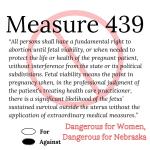Where Californians draw the line; the 4B movement; and the death of P’nut.
Where Californians Draw the Line
California may be the most liberal state in the union, with its Democratic supermajority in state government and its 60% vote for Harris. But California voters draw the line at tolerance for crime and unworkable liberal economic schemes.
Los Angeles Times reporter Mackenzie Mays lamented, in the words of the title of her article, that With progressive ballot measures on track to fail, California’s political identity is questioned.
Back in 2014, a more idealistic time, Californians passed an earlier referendum, Proposition 47, which downgraded thefts from felonies to misdemeanors if the value of what was stolen was less than $950. It also made individual drug use a misdemeanor rather than a felony.
Now, ten years later, after suffering a tsunami of shoplifting, train robberies, and burglaries, plus an army of homeless drug addicts crowding the sidewalks, Californians have reversed all of that, voting in Proposition 36, the “Homelessness, Drug Addiction and Theft Reduction Act,” by an overwhelming 71% margin.
They also voted down a measure that would end “involuntary servitude” in prisons–that is, making convicts work without being paid, “hard labor” being part of the punishment. Progressives pushed this referendum as ending “slavery.” The totals aren’t in yet, but it looks like Californians are voting down that referendum also.
Also, L.A. county residents are firing George Gascón, their soft-on-crime district attorney.
In addition, Californians are voting down measures that would allow jurisdictions to impose rent control (which invariably shrinks the supply of housing) and that would increase the minimum wage to $18 per hour plus cost of living raises thereafter (after the recent raise to $16 per hour has devastated small businesses and raised the unemployment rate).
Says the reporter, “Some progressive voters in the state, where Democrats control the governor’s office and Legislature, were dumbfounded by the early results.”
The 4B Movement
The 4B movement started with Korean feminists, has been popularized on TikTok and Instagram, and is now being embraced by young women traumatized by Donald Trump’s re-election.
In Korean, the letter B is shorthand for the word “no,” so 4B means saying “no” to four things: no sex, no dating, no marriage, no children.
It is a pledge to swear off men completely.
A Washington Post article on the subject attributes a surge of American women taking this pledge on their fears that their “reproductive freedom”–that is, the ability to get an abortion–will be taken away by the newly-elected president, as well as their frustration at the young men in their circle who voted for him.
The 4B commitment seems like a secular version of going into a convent. Nuns take a vow of celibacy, though they do so in the name of service to a higher calling, rather than political pique and hostility against men (a.k.a., misandry). But maybe 4B will bring back the virtue of chastity. Perhaps it heralds the end of the sexual revolution.
The Death of P’Nut
Perhaps you have heard the sad tale of P’Nut the Squirrel, one of the cute animals who are stars of social media. Someone complained to New York state’s Department of Environmental Conservation that P’Nut’s owner, who was running an unlicensed wildlife rescue facility that also cared for a raccoon named Fred, was harboring wild animals, in violation of New York law.
So to conserve the environment, the bureau sent 10 agents to the owner’s home, roughing everything up, and confiscated P’Nut and Fred. Whereupon the squirrel bit one of the agents–of course he did!–so these protectors of wildlife killed him! Or, in their terms, they euthanized P’Nut so he could be tested for rabies.
Unherd’s Oliver Bateman finds the debacle telling:
The modern American bureaucratic state revealed itself in all its absurd glory last week, not through some grand policy initiative or sweeping regulation, but through the tale of a squirrel known as “P’Nut.” In an era of endless crises — migrant surges, shrinking police forces, rising urban crime, housing shortages — New York state marshalled its considerable resources toward a singular mission: dispatching 10 agents to conduct an extensive raid targeting a rescue animal with a social media following.
The resulting spectacle would be comedic if it weren’t so emblematic of institutional decay. Here was a state agency deploying a small army of officials to spend five hours searching a private residence, right down to the plumbing fixtures, all to seize a seven-year-old squirrel living peacefully in upstate New York. . . .
When government agencies expend more energy hunting social media squirrels than addressing systemic societal issues that lead to completely senseless murders like that of New York homeless activist Ryan Carson, they expose the hollowness at the heart of modern bureaucracy. That a single complaint could trigger such an overwhelming response suggests a system operating on autopilot, disconnected from any meaningful sense of proportion or public good.
The results of P’Nut’s post-mortem rabies test have not been released. I would just add this from a rabies fact sheet: “Squirrels, mice, and other small rodents have only very rarely been found to have rabies, and have never been known to transmit rabies to humans or other animals.”













